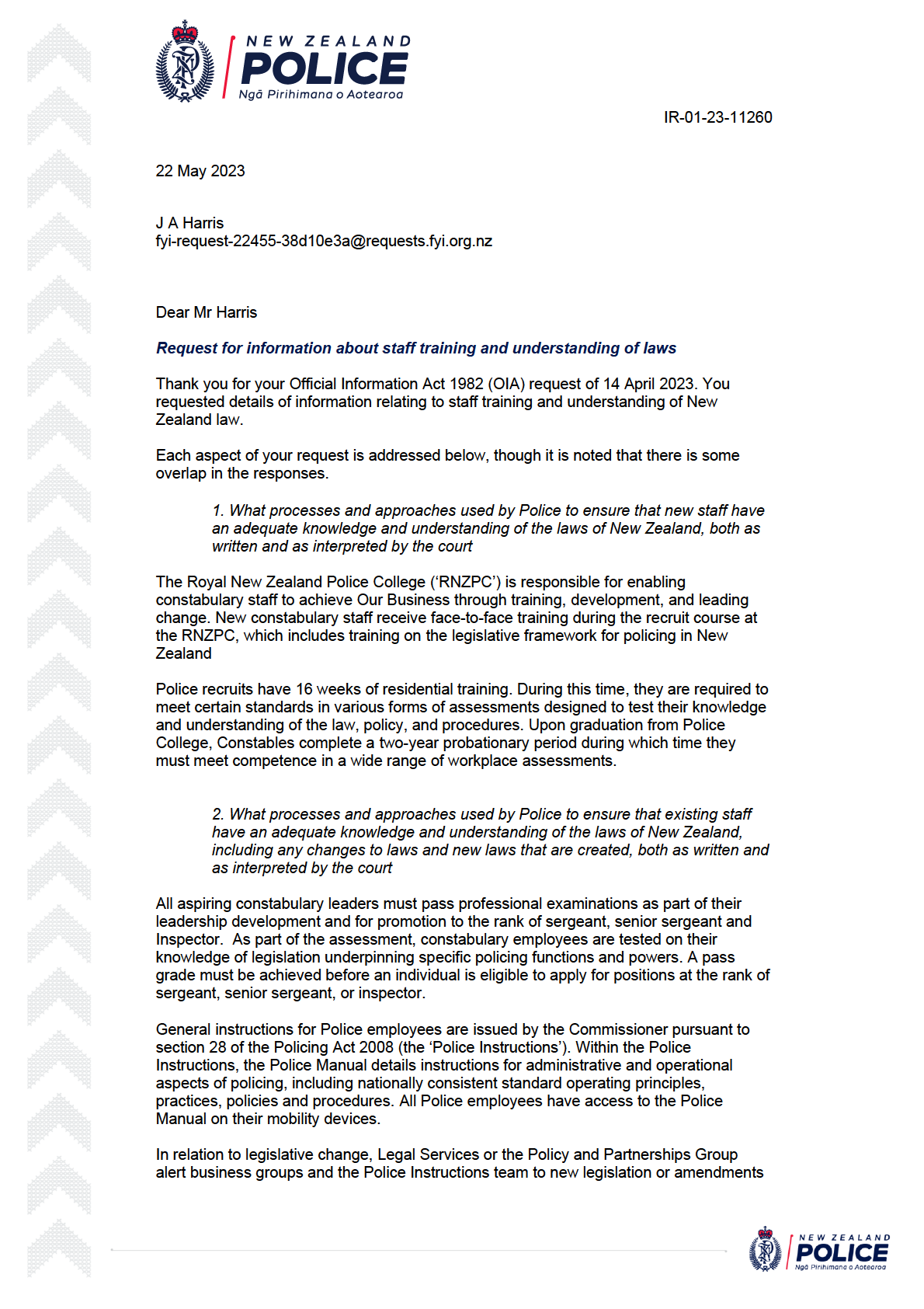


affecting Police. The relevant chapter of the Police Manual is updated by the responsible
business unit.
Employees are notified of legislative changes via an organisation wide Pānui (bulletin
board) notice and/or a note prepared by Legal Services. For significant legislative
changes, nationwide training may be required.
Frontline staff are also able to access the ‘Checkpoint’ application on their mobility
devices. Checkpoint provides an aide-memoire for all frontline staff to assist their
decision-making in the course of their operational duties. It is not a training document but
rather is designed to complement the Police Instructions.
3. What processes and approaches are used to test, assess, or confirm the
knowledge and understanding of law, both as written and as interpreted by the
court of staff/officers
Police uses a wide range of processes and approaches to test, assess and confirm
knowledge of law. These include formative and summative testing of officer’s knowledge,
workplace assessments, online quizzes and assessments and assessments of portfolios
of work as officers train and develop during the course of their careers across a wide
range of sub disciplines within Police. These include training for recruits, recent graduate
constables undertaking workplace assessments, constables’ training to become
detectives within the Criminal Investigation Branch, constables working in Road Policing
and the investigation of accidents, fingerprint technicians, emergency communications
centre staff, service desk staff, and front counter staff.
There is also training for Authorised Offices undertaking a range of roles within Police.
There are compulsory training requirements which Police constabulary staff must
complete to ensure they are appropriately trained, and are equipped to undertake, the
wide range of operational duties that confront them within their role. Compulsory training
includes the Police Integrated Tactical Training (PITT) programme, which is delivered by
the RNZPC and provides the means for maintaining the Police employee’s knowledge of
appropriate use of approved defensive tactics including approved tactical options.
During the 16 weeks of residential training, Police recruits will sit four written exams
comprising of offence analysis short answer questions and a series of multiple-choice
questions. There are also numerous practical assessments throughout the course where
they must meet competence. These are designed to ensure recruits have the required
foundation knowledge required to be a police officer. Following graduation, constables
complete a two-year probationary period during which time they must meet competence
in a wide range of workplace assessments.
In terms of continuing professional development opportunities, Core Policing Knowledge
(CPK) examinations assess whether a constabulary employee seeking promotion holds
the level of core policing knowledge required for the rank to which they aspire.
Constables aspiring to promotion must pass CPK Examinations at Sergeant, Senior
Sergeant and Inspector levels. There are many sub disciples and functional areas within
Police, all of which benefit from direct training in law and practice relevant to their field or
indirect training through generalist training provided to sworn and civilian staff.
Police uses a variety of platforms including internal platforms such as Success Factors
and Totara, as well as an external examination provider ASPEQ for national Core
Policing Knowledge Examinations.
4. Statistics detailing the above, for example, course completion data, numbers of
staff with outstanding training to complete by training type



Police has a vast number of training courses, and this type of information would have to
be manually collated for each. For this reason, this part of your request cannot be made
available without substantial collation or research, therefore it is refused pursuant to
section 18(f) of the OIA. Police does not consider that fixing a charge or extending the
time limit would enable this part of your request to be granted.
5. What resources are available to officers who wish to clarify a legal question or
seek a legal opinion
Police has an in-house legal team that is responsible for providing legal advice and
assistance to staff to reduce and manage legal risk.
All Police employees also have access to legal resources including the Westlaw and
LexisNexis databases, as well as the Police Instructions, which they can consult for
guidance on legal issues.
6. What resources are available to staff who wish to clarify their understanding of
a law or of a police policy or procedure, or of a court judgment or IPCA decision
If a Police employee requires clarification on policy and procedure, they are encouraged
to consult their supervisor for advice. Supervisors are responsible for providing leadership
and specialist knowledge having attained the relevant supervisor qualification through the
CPK examination (for constabulary staff).
All staff are also able to consult the Police Manual in the Police Instructions. The Police
Manual details instructions for administrative and operational aspects of policing,
including nationally consistent standard operating principles, practices, policies and
procedures.
The Checkpoint application is another source of information for frontline staff who wish to
clarify their understanding of procedure.
7. What communication or knowledge or learning platforms, methods, processes,
or frameworks are used by police to ensure staff are up to date with policies,
procedures, new laws, law changes, guidance from the Court, relevant IPCA
decisions etc.
Updates about legislative changes and case law are disseminated within Police via an
organisation wide Pānui (bulletin board) notice and/or a note prepared by Legal Services.
The Checkpoint application is also updated to reflect new legislation, policy and
procedure.
Individual workgroups and Districts also use newsletters and local line up briefings to
communicate change.
I trust this information is of use to you. If you are not satisfied with this response, you may
ask the Ombudsman to investigate and review my decision under section 28(3) of the
OIA.
Yours sincerely
Superintendent Warwick Morehu
Director: Training, The Royal New Zealand Police College
New Zealand Police





